Can Dogs Eat This? Nutrition & Recipes Recipes
Can Dogs Eat Brussels Sprouts? Yes. Here’s How To Do It Right
While humans can be a little picky about Brussels sprouts, dogs almost universally love this crunchy vegetable. But, can dogs eat Brussels sprouts safely, or should you avoid feeding your dog Brussels sprouts?

The good news is that yes, Brussels sprouts are safe for dogs, but you need to do some prep first and share this healthy treat with your dog in moderation.
If your dog has a taste for this cruciferous vegetable and you want to learn more about whether they are good for your dog, how you should prepare them, and the amount of Brussels sprouts you can feed your pooch, you’ve found the right place. Let’s dive into the ins and outs, benefits and drawbacks, and tips and tricks for feeding dogs Brussels sprouts.
Are Brussels Sprouts Good for Dogs? Nutrition & Benefits
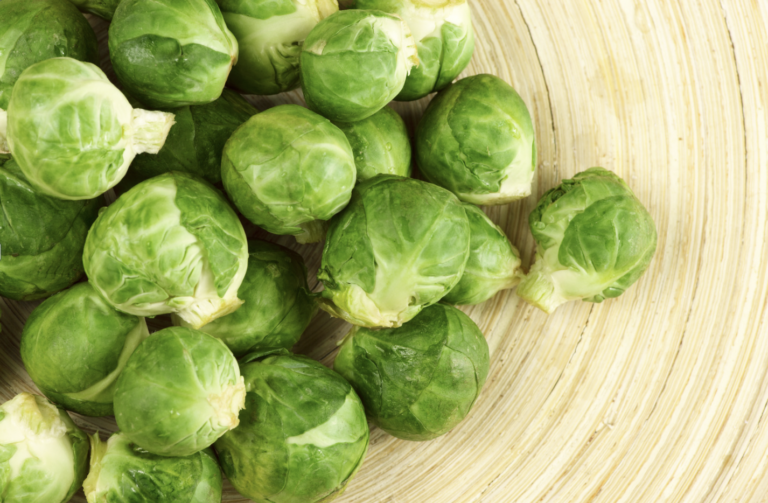
You know your dog can eat Brussels sprouts occasionally without any worry, but are they good for your dog? Good news: Yes! Brussels sprouts are healthy and good for dogs and can even have health benefits when fed to your pup properly.
Brussels sprouts are high in key nutrients, including dietary fiber that can help keep your pup’s digestive system working smoothly. Brussels are also high in antioxidants that protect against free radicals and oxidative stress. You’ll also find tons of vitamins in Brussels sprouts, including K, C, and B6.
| Nutritional Value of Brussels Sprouts | |
| Calcium | Supports bone, muscle, cardiac, nervous system, and dental health. |
| Iron | Supports oxygenation, muscle function, and energy production. |
| Magnesium | Fuels metabolism of other nutrients, supports bone, muscle, and cardiac health. |
| Potassium | An electrolyte to support nerve and muscle function, hydration, blood pressure, etc. |
| Vitamin B6 | Supports nervous system and healthy hormone function, skin and coat health, red blood cell function, etc. |
| Vitamin C | Supports immunity and fuels production of collagen for bone and joint health. |
| Vitamin K | Supports bone, muscle, immune system, and cardiac health. Fuels metabolism of calcium. |
The Downside of Feeding Your Dog Brussels Sprouts
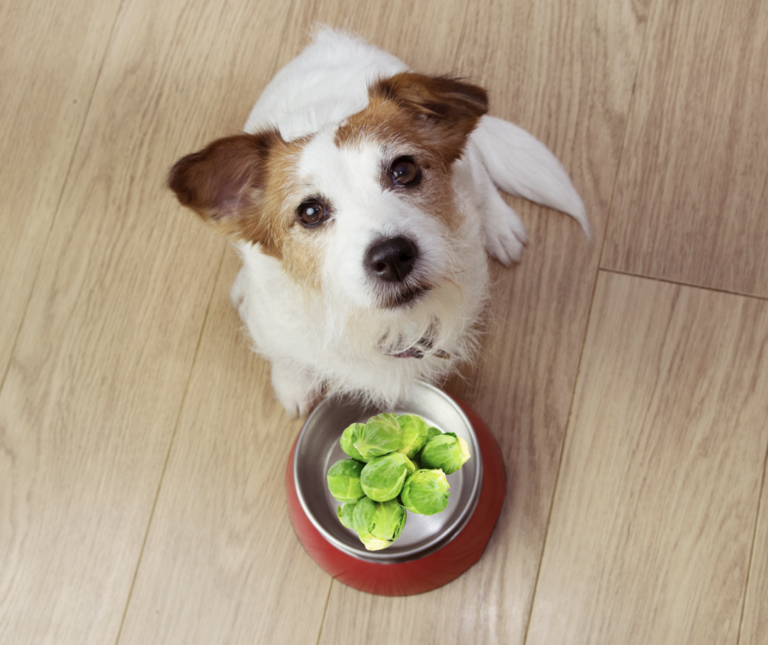
While cooked Brussels sprouts are generally considered a dog-safe treat, there are a few downsides to feeding this vegetable to your four legged friend. The biggest downside can be summed up in two words: stinky farts.
Brussels sprouts—and other cruciferous vegetables—are high in a chemical compound called isothiocyanate. Isothiocyanates can be highly beneficial in moderation and aid digestion, support immunity, and even act as an anti-inflammatory. Combined with high levels of dietary fiber, the isothiocyanates in Brussels sprouts make them an excellent digestive aid.
However, if your dog is eating too many brussels sprouts, the isothiocyanate can also give them some pretty stinky farts. In excess, isothiocyanate can also give your dog an upset stomach or bouts of diarrhea. Isothiocyanate is not harmful or bad for dogs, but you should be careful to limit vegetables like Brussels sprouts to avoid causing gastrointestinal upset.
How To Prepare Brussels Sprouts for Dogs To Eat
The best way to feed your dog Brussels sprouts is by cooking them. Raw Brussels sprouts aren’t toxic or less nutritious for dogs, but they can pose a choking hazard and may be more difficult for your pup to digest. Similarly, if a dog were to eat too large a chunk of raw Brussels sprout, they could face intestinal blockage—though this is rare.
To keep your pooch safe, we recommend using one of these cooking methods to prepare Brussels sprouts for your dog. Add Brussels to dog food as a topper or share with your pup as a between meal treat!
Steamed Brussels Sprouts for Dogs
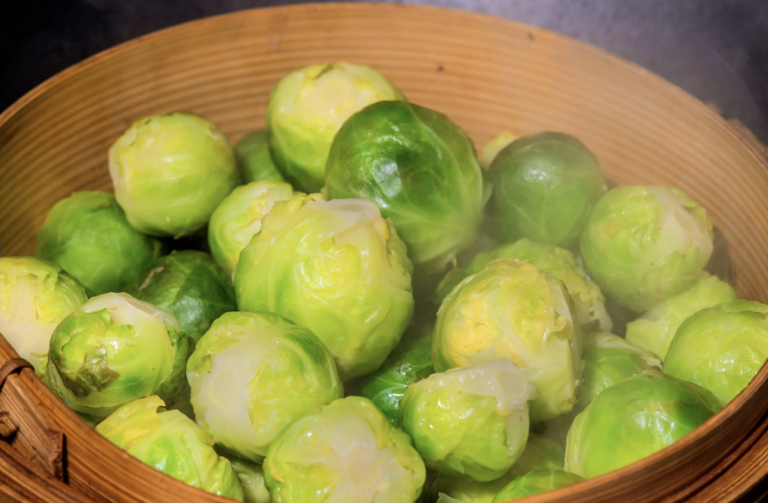
Steaming is the best cooking method for retaining key nutrients in vegetables like Brussels sprouts, and always our first choice for preparing veggies for our dogs. You can steam Brussels sprouts whole, but we like to slice them in half before steaming for a faster cook time.
How To Steam Brussels Sprouts
- Wash, trim, and remove brown or dead leaves from the outside of your Brussels sprouts.
- Slice each sprout in half.
- Fill a medium sized pot with water about halfway and top with your steamer basket and a tight-fitting lid to cover. Bring the water to a boil.
- Add the Brussels sprout halves to the steamer basket, cover, and steam for 5-10 minutes or until the sprouts are fork tender.
- Cool before serving and store in an airtight container in the refrigerator for up to 4 days.
Boiled Brussels Sprouts for Dogs
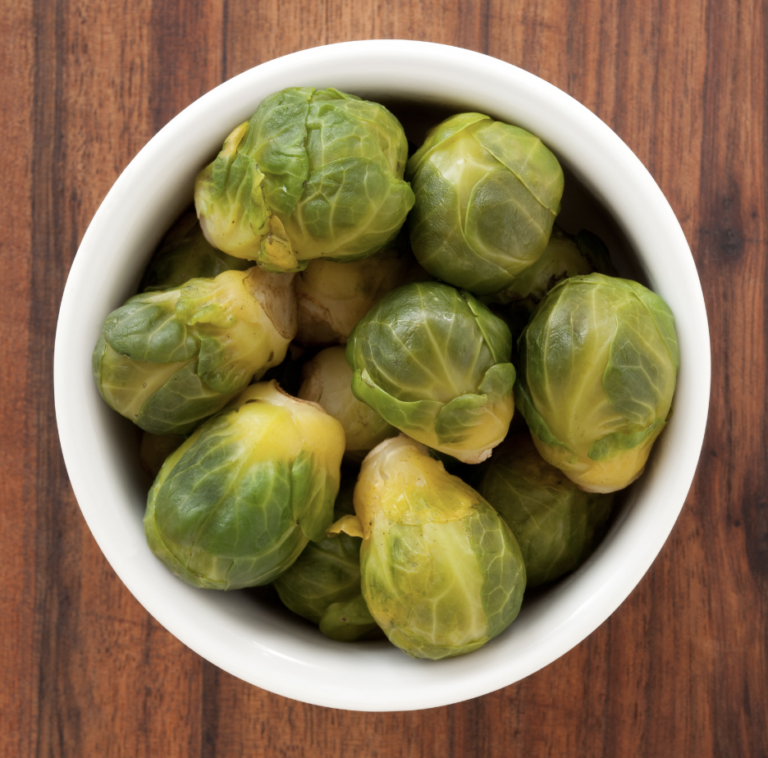
Like steaming, boiling Brussels sprouts helps to retain most of this vegetable’s vital nutrients, but you won’t need any special equipment!
How To Boil Brussel Sprouts
- Wash, trim, and remove brown or dead leaves from the outside of your Brussels sprouts.
- Place the whole Brussels sprouts in a large pan and cover with water.
- Bring the water and Brussels sprouts to a boil, then reduce the heat to medium, cover, and cook for 5-8 minutes or until fork tender.
- Cool completely then slice each sprout in half before serving.
Roasted Brussels Sprouts for Dogs
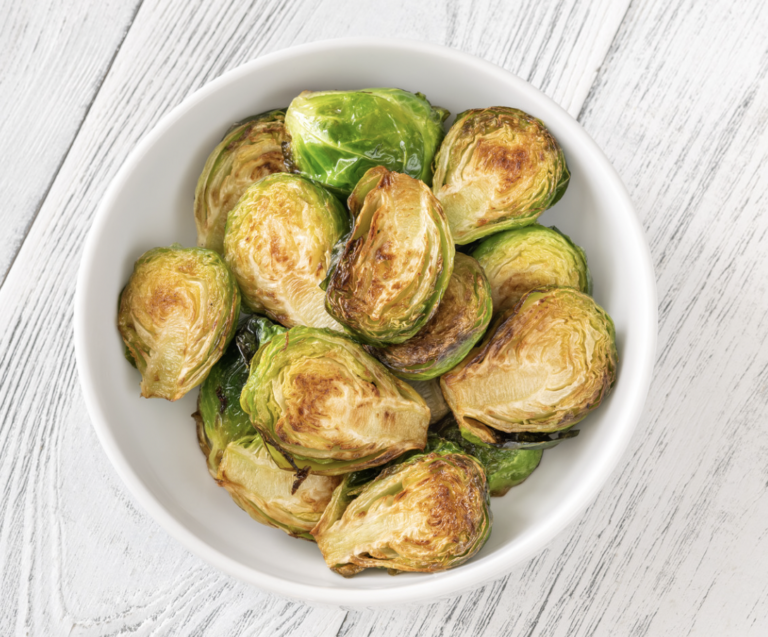
If your dog will only eat crispy vegetables, roasting is another great way to add Brussels sprouts to your dog’s diet.
How To Roast Brussels Sprouts
- Preheat the oven to 425℉.
- Wash, trim, and remove brown or dead leaves from the outside of your Brussels sprouts.
- Slice each sprout in half.
- Line a baking sheet with foil and spread the Brussels sprouts in an even layer.
- Add a small sprinkle of olive oil and toss the sprouts.
- Roast the sprouts for 25-40 minutes or until tender on the inside and crispy on the outside.
- Cool completely before serving.
Can Dogs Eat Brussels Sprouts? FAQ
Don’t scroll away just yet! We have a few more pieces of advice for feeding your dog Brussels sprouts.
Can dogs eat Brussels sprouts cooked?
Yes! Cooked Brussels sprouts are perfectly safe for dogs in moderation.
Can dogs eat Brussels sprouts raw?
Yes, but use caution. Only feed your dog very small pieces of raw Brussels sprout—cooked sprouts are better and don’t pose the same risk of intestinal blockage.
Can dogs eat Brussels sprout stalks?
Can dogs eat raw brussel sprout stalks? What about cooked? Yes to both—in moderation. Like the sprouts themselves, Brussels sprout stalks are safe for dogs. The tender core of the stalk is the safest bit to share with your dog, since the outer skin can be difficult to digest.
Can dogs eat Brussels sprout leaves?
Yes! Brussels sprout leaves look a little like collard greens or kale, and are safe for dogs to eat. They are safest and best when cooked.
How often can dogs eat Brussels sprouts?
We recommend starting with ½–1 Brussels sprout as a treat for your dog once or twice a week. If they do well with this small amount, you may feed as many as three in a serving, but we recommend not doing this every day. Limit Brussels sprouts in your dog’s diet to 2-4 times a week at most and monitor your dog for signs of tummy trouble.
Related Posts:
- Can Dogs Eat Cabbage? How This Common Veggie Can Transform Your Dog’s Diet!
- Pancake Panic: Can You Share Your Stack With Fido? Can Dogs Eat Pancakes?
- Can Dogs Eat Avocados? The Canine Avocado Debate




